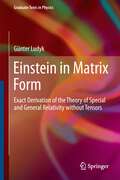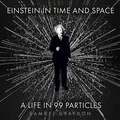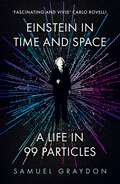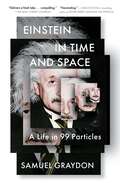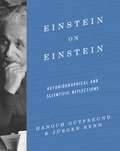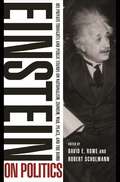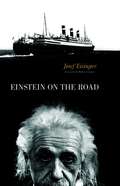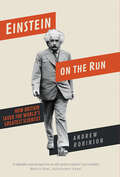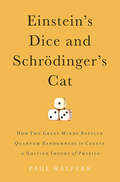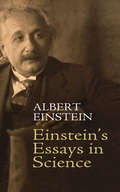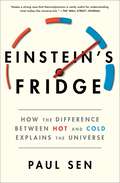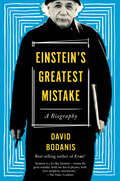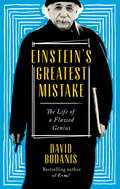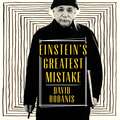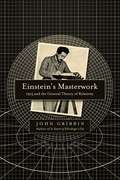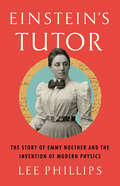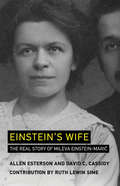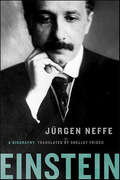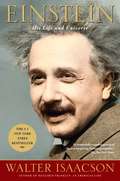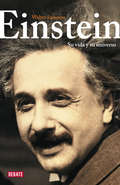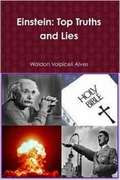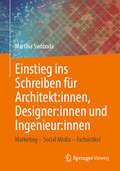- Table View
- List View
Einstein in Matrix Form: Exact Derivation of the Theory of Special and General Relativity without Tensors
by Günter LudykThis book is an introduction to the theories of Special and General Relativity. The target audience are physicists, engineers and applied scientists who are looking for an understandable introduction to the topic - without too much new mathematics. The fundamental equations of Einstein's theory of Special and General Relativity are derived using matrix calculus, without the help of tensors. This feature makes the book special and a valuable tool for scientists and engineers with no experience in the field of tensor calculus. In part I the foundations of Special Relativity are developed, part II describes the structure and principle of General Relativity. Part III explains the Schwarzschild solution of spherical body gravity and examines the "Black Hole" phenomenon. Any necessary mathematical tools are user friendly provided, either directly in the text or in the appendices.
Einstein in Time and Space: A Life in 99 Particles
by Samuel GraydonA rollercoaster ride through the life and ideas of the twentieth century's most famous and controversial scientist in 99 sparkling vignettes.DROPOUT. PACIFIST. PHYSICIST. CASANOVA. REFUGEE. REBEL. GENIUS.THINK YOU KNOW EINSTEIN? THINK AGAINHis face is instantly recognisable. His name is shorthand for genius. Today, he's a figurehead as much as a man, symbolic of things larger than himself: of scientific progress, of the human mind, even of the age. But who was Einstein really?The Nobel Prize-winning physicist who discovered relativity, black holes and E = mc2, dined with Charlie Chaplin in Hollywood and was the inspiration for (highly radioactive) element 99, Albert Einstein was also a high school dropout with an FBI file 1,400 pages long.In this audiobook, Samuel Graydon's writing brings history's most famous scientist back to life. From his lost daughter to escaping the Nazis, from his love letters to unlikely inventions, from telling jokes to cheer up his sad parrot Bibo to refusing the Presidency of Israel, through the discoveries and thought experiments that changed science, Einstein in Time and Space tells 99 unforgettable stories of the man who redefined how we view our universe and our place within it.(P)2023 Hodder & Stoughton Limited
Einstein in Time and Space: A Life in 99 Particles
by Samuel GraydonDROPOUT. PACIFIST. PHYSICIST. CASANOVA. REFUGEE. REBEL. GENIUS.THINK YOU KNOW EINSTEIN? THINK AGAINHis face is instantly recognisable. His name is shorthand for genius. Today, he's a figurehead as much as a man, symbolic of things larger than himself: of scientific progress, of the human mind, even of the age. But who was Einstein really?The Nobel Prize-winning physicist who discovered relativity, black holes and E = mc2, dined with Charlie Chaplin in Hollywood and was the inspiration for (highly radioactive) element 99, Albert Einstein was also a high school dropout with an FBI file 1,400 pages long.In this book, Samuel Graydon brings history's most famous scientist back to life. From his lost daughter to escaping the Nazis, from his love letters to unlikely inventions, from telling jokes to cheer up his sad parrot Bibo to refusing the Presidency of Israel, through the discoveries and thought experiments that changed science, Einstein in Time and Space tells 99 unforgettable stories of the man who redefined how we view our universe and our place within it.
Einstein in Time and Space: A Life in 99 Particles
by Samuel GraydonWalter Isaacson&’s Einstein meets Craig Brown&’s 99 Glimpses of Princess Margaret, in this innovative biography of the famous physicist told in ninety-nine dazzling vignettes.Most of us would agree that Albert Einstein&’s name is synonymous with &“genius&” and that his likeness is often used as a shorthand for all scientists, appearing everywhere from cartoons to textbooks. He has become more myth than man. That being the case, how best to capture his essence? In Einstein in Time and Space, talented young science journalist Samuel Graydon answers that question with an illuminating mosaic—99 intriguingly different particles that cumulatively reveal Einstein&’s contradictory and multitudinous nature. Glimpsed among these shards: a slacker who failed every subject but math, a job seeker who couldn&’t get hired, a lothario who courted many women, and a charmer who was the life of the party. As brilliant as he was inconsistent, Einstein was simultaneously an avid supporter of the NAACP and the fight for civil rights and someone capable of great prejudice. He was loved by many, known by few, and inspirational to a generation of young physicists. Graydon reveals every corner of Einstein&’s world: the false reporting that rocketed Einstein to fame nearly overnight, his effect on people he met merely in passing, even the remarkable posthumous journey of the famed physicist&’s brain. Entertaining, comforting, bolstering, and shocking, Einstein in Time and Space is the unique story of a man who redefined how we view our universe and our place within it.
Einstein on Einstein: Autobiographical and Scientific Reflections
by Hanoch Gutfreund Jürgen RennNew perspectives on the iconic physicist's scientific and philosophical formationAt the end of World War II, Albert Einstein was invited to write his intellectual autobiography for the Library of Living Philosophers. The resulting book was his uniquely personal Autobiographical Notes, a classic work in the history of science that explains the development of his ideas with unmatched warmth and clarity. Hanoch Gutfreund and Jürgen Renn introduce Einstein's scientific reflections to today's readers, tracing his intellectual formation from childhood to old age and offering a compelling portrait of the making of a philosopher-scientist.Einstein on Einstein features the full English text of Autobiographical Notes along with incisive essays that place Einstein's reflections in the context of the different stages of his scientific life. Gutfreund and Renn draw on Einstein's writings, personal correspondence, and critical writings by Einstein's contemporaries to provide new perspectives on his greatest discoveries. Also included are Einstein's responses to his critics, which shed additional light on his scientific and philosophical worldview. Gutfreund and Renn quote extensively from Einstein's initial, unpublished attempts to formulate his response, and also look at another brief autobiographical text by Einstein, written a few weeks before his death, which is published here for the first time in English.Complete with evocative drawings by artist Laurent Taudin, Einstein on Einstein illuminates the iconic physicist's journey to general relativity while situating his revolutionary ideas alongside other astonishing scientific breakthroughs of the twentieth century.
Einstein on Politics: His Private Thoughts and Public Stands on Nationalism, Zionism, War, Peace, and the Bomb
by Albert EinsteinThe most famous scientist of the twentieth century, Albert Einstein was also one of the century's most outspoken political activists. Deeply engaged with the events of his tumultuous times, from the two world wars and the Holocaust, to the atomic bomb and the Cold War, to the effort to establish a Jewish homeland, Einstein was a remarkably prolific political writer, someone who took courageous and often unpopular stands against nationalism, militarism, anti-Semitism, racism, and McCarthyism. In Einstein on Politics, leading Einstein scholars David Rowe and Robert Schulmann gather Einstein's most important public and private political writings and put them into historical context. The book reveals a little-known Einstein--not the ineffectual and naïve idealist of popular imagination, but a principled, shrewd pragmatist whose stands on political issues reflected the depth of his humanity.Nothing encapsulates Einstein's profound involvement in twentieth-century politics like the atomic bomb. Here we read the former militant pacifist's 1939 letter to President Franklin D. Roosevelt warning that Germany might try to develop an atomic bomb. But the book also documents how Einstein tried to explain this action to Japanese pacifists after the United States used atomic weapons to destroy Hiroshima and Nagasaki, events that spurred Einstein to call for international control of nuclear technology.A vivid firsthand view of how one of the twentieth century's greatest minds responded to the greatest political challenges of his day, Einstein on Politics will forever change our picture of Einstein's public activism and private motivations.
Einstein on the Road
by Josef EisingerAt the height of his fame, Albert Einstein traveled throughout the world, from Japan to South America and many places in between. During these voyages, between 1922 and 1933, he was in the habit of keeping travel diaries in which he recorded his impressions of people and events, as well as his musings on everything from music and politics to quantum mechanics and psychoanalysis. These fascinating records are now here published in thier entirety, painting an engaging personal portrait of Einstein the man. The author has created a vivid and entertaining narrative that brings Einstein's voice to the fore. During Einstein's travels far and wide, he meets with royalty, presidents, movie stars, and artists-Franklin and Eleanor Roosevelt, Winston Churchill, Charlie Chaplin, Fritz Kreisler, and Sinclair Lewis, as well as the most eminent scientists of the time, including Niels Bohr, Max Planck, Erwin Schrödinger, and Edwin Hubble. In his travel entries, we read his candid impressions of the Far East during a long sea voyage to Japan (1922), where Einstein is welcomed with enormous enthusiasm, and steals the show at an imperial reception. He and Elsa visit and explore many Japanese cities, as well as Singapore, Sri Lanka, Hong Kong, Shanghai, Barcelona, Madrid, and Jerusalem, where Einstein cogitates on Zionism and sees it in action. In 1931, the couple spends eight weeks in Pasadena, where Einstein enjoys fruitful interactions with scientists at Caltech and the Mount Wilson observatory. This portion of the diaries contains illuminating observations about America, science, and the Hollywood celebrities he encounters. He returns to Caltech two more times, and enjoys two extended sojourns in another academic sanctuary, Oxford University. Back at home in Berlin, his diary shows his deep involvement with the academic, social, and cultural life of the German capital, and with the politics of the Weimar Republic. He discusses books, dinner parties, plays, concerts, and sailing, but his greatest passion, apart from physics, is music; he is never happier than when playing chamber music, preferably Mozart-and he does so at every opportunity. A lifelong pacifist, he watches the rise of the Nazis with anxiety, and when Hitler gains control in 1933, he renounces pacifism and searches for a place of refuge. He finds it in Princeton, New Jersey, where he joins the newly created Institute for Advanced Study and becomes an American, never more to roam. Filled with memorable vignettes, this singular book provides a window into the thoughts and opinions of the twentieth century's most celebrated scientist and allows us to share in his exhilarating experiences.
Einstein on the Run: How Britain Saved the World's Greatest Scientist
by Andrew RobinsonA "highly readable" account of the role Britain played in Einstein's life—by inspiring his teenage passion for physics and providing refuge from the Nazis (The Wall Street Journal).In late 1933, Albert Einstein found himself living alone in an isolated holiday hut in rural England. There, he toiled peacefully at mathematics, occasionally stepping out for walks or to play his violin. But how had Einstein come to abandon his Berlin home and go “on the run”?This lively account tells the story of the world’s greatest scientist’s time in Britain for the first time, showing why the country was the perfect refuge for Einstein from rumored assassination plots by Nazi agents. Young Einstein’s passion for British physics, epitomized by Newton, had sparked his scientific development around 1900. British astronomers had confirmed his general theory of relativity, making him internationally famous in 1919. Welcomed by the British people, who helped him campaign against Nazi anti-Semitism, he even intended to become a British citizen. So why did Einstein then leave Britain, never to return to Europe?“A vivid look at how the U.K. affected the German-born physicist’s life and thinking.” —Publishers Weekly“A marvelous job of pulling new and interesting material out of the Einstein archives . . . I suspect that even readers who have devoured many books about Einstein and are already familiar with his interactions with the English . . . will find much to learn and enjoy.” —Metascience Journal“Robinson has that rare knack for presenting a near-encyclopedic volume of historical information, anecdotes and contemporaneous accounts in a thoroughly delightful fashion.” —Physics WorldIncludes photographs and illustrations
Einstein's Dice and Schrödinger's Cat: How Two Great Minds Battled Quantum Randomness to Create a Unified Theory of Physics
by Paul HalpernWhen the fuzzy indeterminacy of quantum mechanics overthrew the orderly world of Isaac Newton, Albert Einstein and Erwin Schrödinger were at the forefront of the revolution. Neither man was ever satisfied with the standard interpretation of quantum mechanics, however, and both rebelled against what they considered the most preposterous aspect of quantum mechanics: its randomness. Einstein famously quipped that God does not play dice with the universe, and Schrödinger constructed his famous fable of a cat that was neither alive nor dead not to explain quantum mechanics but to highlight the apparent absurdity of a theory gone wrong. But these two giants did more than just criticize: they fought back, seeking a Theory of Everything that would make the universe seem sensible again. In Einstein’s Dice and Schrödinger’s Cat, physicist Paul Halpern tells the little-known story of how Einstein and Schrödinger searched, first as collaborators and then as competitors, for a theory that transcended quantum weirdness. This story of their quest--which ultimately failed--provides readers with new insights into the history of physics and the lives and work of two scientists whose obsessions drove its progress. Today, much of modern physics remains focused on the search for a Theory of Everything. As Halpern explains, the recent discovery of the Higgs Boson makes the Standard Model--the closest thing we have to a unified theory-- nearly complete. And while Einstein and Schrödinger failed in their attempt to explain everything in the cosmos through pure geometry, the development of string theory has, in its own quantum way, brought this idea back into vogue. As in so many things, even when they were wrong, Einstein and Schrödinger couldn’t help but get a great deal right.
Einstein's Essays in Science
by Albert Einstein Alan HarrisHis name is synonymous with "genius," but these essays by the renowned physicist and scholar are accessible to any reader. In addition to outlining the core of relativity theory in everyday language, Albert Einstein presents fascinating discussions of other scientific fields to which he made significant contributions. The Nobel Laureate also profiles some of history's most influential physicists, upon whose studies his own work was based.Assembled during Einstein's lifetime from his speeches and essays, this book marks the first presentation to the wider world of the scientist's accomplishments in the field of abstract physics. Along with relativity theory, these articles examine the methods of theoretical physics, principles of research, and the concept of scientific truth. Einstein's speeches to audiences at Columbia University and the Prussian Academy of Science appear here, along with his insightful observations on such giants of science as Johannes Kepler, Sir Isaac Newton, James Clerk Maxwell, Niels Bohr, Max Planck, and others.
Einstein's Fridge: How the Difference Between Hot and Cold Explains the Universe
by Paul SenAn entertaining, eye-opening account of the extraordinary team of innovators who discovered the laws of thermodynamics essential to understanding the world today—from refrigeration and jet engines to calorie counting and global warming—for fans of How We Got to Now and A Short History of Nearly Everything.Einstein&’s Fridge tells the incredible epic story of the scientists who, over two centuries, harnessed the power of heat and ice and formulated a theory essential to comprehending our universe. Thermodynamics—the branch of physics that deals with energy and entropy—is the least known and yet most consequential of all the sciences. It governs everything from the behavior of living cells to the black hole at the center of our galaxy. Not only that, but thermodynamics explains why we must eat and breathe, how lights turn on, the limits of computing, and how the universe will end. The brilliant people who decoded its laws came from every branch of the sciences; they were engineers, physicists, chemists, biologists, cosmologists, and mathematicians. From French military engineer and physicist Sadi Carnot to Lord Kelvin, James Joule, Albert Einstein, Emmy Noether, Alan Turing, and Stephen Hawking, author Paul Sen introduces us to all of the players who passed the baton of scientific progress through time and across nations. Incredibly driven and idealistic, these brave pioneers performed groundbreaking work often in the face of torment and tragedy. Their discoveries helped create the modern world and transformed every branch of science, from biology to cosmology. Einstein&’s Fridge brings to life one of the most important scientific revolutions of all time and captures the thrill of discovery and the power of scientific progress to shape the course of history.
Einstein's Greatest Mistake: A Biography
by David Bodanis&“What Bodanis does brilliantly is to give us a feel for Einstein as a person. I don&’t think I&’ve ever read a book that does this as well . . . Whenever there&’s a chance for storytelling, Bodanis triumphs.&” —Popular Science &“Fascinating.&” —Forbes Widely considered the greatest genius of all time, Albert Einstein revolutionized our understanding of the cosmos with his general theory of relativity and helped lead us into the atomic age. Yet in the final decades of his life, he was ignored by most working scientists, and his ideas were opposed by even his closest friends. How did this happen? Best-selling biographer David Bodanis traces the arc of Einstein&’s life—from the skeptical, erratic student to the world&’s most brilliant physicist to the fallen-from-grace celebrity. An intimate biography in which &“theories of the universe morph into theories of life&” (Times, London), Einstein&’s Greatest Mistake reveals what we owe Einstein today—and how much more he might have achieved if not for his all-too-human flaws.
Einstein's Greatest Mistake: The Life of a Flawed Genius
by David BodanisWidely considered the greatest genius of all time, Albert Einstein revolutionised our understanding of the cosmos with his general theory of relativity and helped to lead us into the atomic age. Yet in the final decades of his life he was also ignored by most working scientists, his ideas opposed by even his closest friends. This stunning downfall can be traced to Einstein's earliest successes and to personal qualities that were at first his best assets. Einstein's imagination and self-confidence served him well as he sought to reveal the universe's structure, but when it came to newer revelations in the field of quantum mechanics, these same traits undermined his quest for the ultimate truth. David Bodanis traces the arc of Einstein's intellectual development across his professional and personal life, showing how Einstein's confidence in his own powers of intuition proved to be both his greatest strength and his ultimate undoing. He was a fallible genius. An intimate and enlightening biography of the celebrated physicist, Einstein's Greatest Mistake reveals how much we owe Einstein today - and how much more he might have achieved if not for his all-too-human flaws.
Einstein's Greatest Mistake: The Life of a Flawed Genius
by David BodanisWidely considered the greatest genius of all time, Albert Einstein revolutionised our understanding of the cosmos with his general theory of relativity and helped to lead us into the atomic age. Yet in the final decades of his life he was also ignored by most working scientists, his ideas opposed by even his closest friends. This stunning downfall can be traced to Einstein's earliest successes and to personal qualities that were at first his best assets. Einstein's imagination and self-confidence served him well as he sought to reveal the universe's structure, but when it came to newer revelations in the field of quantum mechanics, these same traits undermined his quest for the ultimate truth. David Bodanis traces the arc of Einstein's intellectual development across his professional and personal life, showing how Einstein's confidence in his own powers of intuition proved to be both his greatest strength and his ultimate undoing. He was a fallible genius. An intimate and enlightening biography of the celebrated physicist, Einstein's Greatest Mistake reveals how much we owe Einstein today - and how much more he might have achieved if not for his all-too-human flaws.
Einstein's Masterwork: 1915 and the General Theory of Relativity
by John GribbinOne of the world's most celebrated science writers reveals the origins of Einstein's General Theory--and provides a greater understanding of who Einstein was at the time of this pivotal achievement. In 1915, Albert Einstein presented his masterwork to the Prussian Academy of Sciences--a theory of gravity, matter, space and time: the General Theory of Relativity. Einstein himself said it was "the most valuable theory of my life," and "of incomparable beauty." It describes the evolution of the universe, black holes, the behavior of orbiting neutron stars, and why clocks run slower on the surface of the earth than in space. It even suggests the possibility of time travel. And yet when we think of Einstein's breakthrough year, we think instead of 1905, the year of Einstein's Special Theory of Relativity and his equation E=mc2, as his annus mirabilis, even though the Special Theory has a narrower focus. Today the General Theory is overshadowed by these achievements, regarded as 'too difficult' for ordinary mortals to comprehend. In Einstein's Masterwork, John Gribbin puts Einstein's astonishing breakthrough in the context of his life and work, and makes it clear why his greatest year was indeed 1915 and his General Theory his true masterpiece.
Einstein's Opponents
by Milena Wazeck Geoffrey S. KobyThis detailed account of the controversy surrounding the publication of Albert Einstein's theory of relativity explores the ferocious popular and academic opposition which at one time encircled one of the most important scientific breakthroughs of the twentieth century. Based on extensive archival research, this fascinating discourse includes a compelling and entertaining examination of the contemporary literature created by Einstein's detractors. Exploring the arguments and strategies, social contexts, and motivations of Einstein's detractors, and providing unique insights into the dynamics of scientific controversies, this book is ideal for anyone interested in the history and philosophy of physics, popular science, and the public understanding of science.
Einstein's Tutor: The Story of Emmy Noether and the Invention of Modern Physics
by Lee PhillipsA revelatory story of the woman who made foundational contributions to science and mathematics and persevered in the face of discrimination. Emmy Noether's mathematical genius enabled Einstein to bring his General Theory of Relativity–the basis of our current theory of gravity–to fruition. On a larger scale, what came to be known as &“Noether&’s Theorem&”—called by a Nobel laureate &“the single most profound result in all of physics&”—supplied the basis for the most accurate theory in the history of physics, the Standard Model, which forms our modern theory of matter. Noether&’s life story is equally important and revelatory in understanding the pernicious nature of sexual prejudice in the sciences, revealing the shocking discrimination against one of the true intellectual giants of the twentieth century, a woman effectively excluded from the opportunities given to her male counterparts. Noether&’s personality and optimistic spirit, as Lee Phillips reveals, enabled her unique genius to persevere and arrive at insights that still astonish those who encounter them a century later.
Einstein's Unification
by Jeroen Van DongenWhy did Einstein tirelessly study unified field theory for more than 30 years? In this book, the author argues that Einstein believed he could find a unified theory of all of nature's forces by repeating the methods he thought he had used when he formulated general relativity. The book discusses Einstein's route to the general theory of relativity, focusing on the philosophical lessons that he learnt. It then addresses his quest for a unified theory for electromagnetism and gravity, discussing in detail his efforts with Kaluza-Klein and, surprisingly, the theory of spinors. From these perspectives, Einstein's critical stance towards the quantum theory comes to stand in a new light. This book will be of interest to physicists, historians and philosophers of science.
Einstein's Wife: The Real Story of Mileva Einstein-Mari? (The\mit Press Ser.)
by David C. Cassidy Allen EstersonWas Einstein's first wife his uncredited coauthor, unpaid assistant, or his unacknowledged helpmeet? The real “Mileva Story.”Albert Einstein's first wife, Mileva Einstein-Marić, was forgotten for decades. When a trove of correspondence between them beginning in their student days was discovered in 1986, her story began to be told. Some of the tellers of the “Mileva Story” made startling claims: that she was a brilliant mathematician who surpassed her husband, and that she made uncredited contributions to his most celebrated papers in 1905, including his paper on special relativity. This book, based on extensive historical research, uncovers the real “Mileva Story.” Mileva was one of the few women of her era to pursue higher education in science; she and Einstein were students together at the Zurich Polytechnic. Mileva's ambitions for a science career, however, suffered a series of setbacks—failed diploma examinations, a disagreement with her doctoral dissertation adviser, an out-of-wedlock pregnancy by Einstein. She and Einstein married in 1903 and had two sons, but the marriage failed. Was Mileva her husband's uncredited coauthor, unpaid assistant, or his essential helpmeet? It's tempting to believe that she was her husband's secret collaborator, but the authors of Einstein's Wife look at the actual evidence, and a chapter by Ruth Lewin Sime offers important historical context. The story they tell is that of a brave and determined young woman who struggled against a variety of obstacles at a time when science was not very welcoming to women.
Einstein: A Biography
by Jurgen Neffe Shelley Frischinteresting book. There several German and Austrian names in the text but the book is absolutely intriguing.
Einstein: A Biography
by Jürgen NeffeAlbert Einstein is an icon of the twentieth century. Born in Ulm, Germany, in 1879, he is most famous for his theory of relativity. He also made enormous contributions to quantum mechanics and cosmology, and for his work he was awarded the Nobel Prize in 1921. A self-pronounced pacifist, humanist, and, late in his life, democratic socialist, Einstein was also deeply concerned with the social impact of his discoveries. Much of Einstein's life is shrouded in legend. From popular images and advertisements to various works of theater and fiction, he has come to signify so many things. In Einstein: A Biography, Jürgen Neffe presents a clear and probing portrait of the man behind the myth. Unearthing new documents, including a series of previously unknown letters from Einstein to his sons, which shed new light on his role as a father, Neffe paints a rich portrait of the tumultuous years in which Einstein lived and worked. And with a background in the sciences, he describes and contextualizes Einstein's enormous contributions to our scientific legacy.Einstein, a breakout bestseller in Germany, is sure to be a classic biography of the man and proverbial genius who has been called "the brain of the [twentieth] century."
Einstein: His Life and Universe (Great Thinkers Ser.)
by Walter IsaacsonBy the author of the acclaimed bestsellers Benjamin Franklin and Steve Jobs, this is the definitive biography of Albert Einstein. How did his mind work? What made him a genius? Isaacson’s biography shows how his scientific imagination sprang from the rebellious nature of his personality. His fascinating story is a testament to the connection between creativity and freedom. Based on newly released personal letters of Einstein, this book explores how an imaginative, impertinent patent clerk—a struggling father in a difficult marriage who couldn’t get a teaching job or a doctorate—became the mind reader of the creator of the cosmos, the locksmith of the mysteries of the atom, and the universe. His success came from questioning conventional wisdom and marveling at mysteries that struck others as mundane. This led him to embrace a morality and politics based on respect for free minds, free spirits, and free individuals. These traits are just as vital for this new century of globalization, in which our success will depend on our creativity, as they were for the beginning of the last century, when Einstein helped usher in the modern age.
Einstein: Su vida y su universo
by Walter IsaacsonLa biografía definitiva de Albert Einstein, uno de los iconos del siglo XX y su mayor genio. Albert Einstein es uno de los científicos más importantes de la historia y un icono del siglo XX. ¿Cómo funcionaba su mente? ¿Qué le hizo un genio? ¿Cómo era el hombre detrás de la celebridad? Walter Isaacson, que tuvo acceso a los archivos de Einstein, ofrece un extraordinario retrato del personaje y de su época, así como un fascinante relato de su vida. A partir de su correspondencia privada, cuenta cómo un funcionario de patentes imaginativo e impertinente (un mal padre con un matrimonio complicado, incapaz de conseguir un empleo en la universidad ni un doctorado) logró desvelar los secretos del cosmos y comprender los misterios del átomo y del universo. Su creatividad estaba ligada a su rebeldía. Su éxito se basó en cuestionar las verdades aceptadas y en asombrarse ante cuestiones que otros consideraban mundanas. Reseñas: «Espléndida, un gran trabajo de investigación con mucho material inédito. Una obra fundamental y definitiva.»Amir D. Aczel, The Boston Globe «Walter Isaacson ha logrado un retrato completo de Einstein. Con un estilo ágil que disimula su atención al detalle y a la precisión científica, nos lleva a un maravilloso viaje por la vida, la mente y la ciencia de un hombre que cambió nuestra visión del universo.»Brian Greene, autor de El tejido del cosmos «Una biografía extraordinaria de un gran hombre. Walter Isaacson ha conseguido reflejar a Einstein como ser humano y al tiempo explicar profundos conceptos físicos. Su biografía se lee con placer y logra que el gran científico vuelva a la vida.»Murray Gell-Mann, Premio Nobel y autor de El quark y el jaguar «Magnífica. La biografía más completa de Einstein para el gran público. Una narración excelente.»Sharon Begley, Newsweek
Einstein: Top Truths And Lies
by Waldon VolpiceliWas Einstein Religious or Atheist? Did Einstein help build the atomic bomb? (in this book you will find the backstage pertaining to the arms race between the Allies and the Nazis for obtaining the atomic bomb). Did Einstein create the theory of relativity or was it his wife, Mileva Maric? Was Einstein a Communist? Was he autistic? All the truths and lies about Albert Einstein revealed in this book.
Einstieg ins Schreiben für Architekt: Marketing – Social Media – Fachartikel
by Martina SwobodaIn der Praxis planender und gestaltender Berufsgruppen gibt es viele Bereiche, in denen ein versiertes Verfassen von Texten ein klarer Wettbewerbsvorteil sein kann. Diese Publikation richtet sich explizit an Architekt:innen, Designer:innen und Ingenieur:innen, die ihre Arbeit in den sozialen Medien, auf ihrer Homepage, in Fachzeitschriften oder in einem eigenen Buch vorstellen möchten. Sie bekommen Hilfestellung beim Vorgehen und erhalten Tipps, um motiviert eine hohe Qualität ihrer Texte zu erreichen. Hinweise, wie sie künstliche Intelligenz (KI) für die Erstellung ihrer Texte nutzen können, runden das Werk ab.
